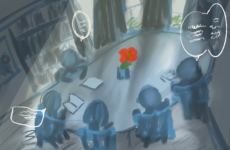
Graphic by Yunjin Kim ’23
The first week back on campus, I began asking my friends what they thought of Ross Gay’s The Book of Delights. The consensus was clear: many students found the text to be less than delightful.
After attempting to power through the collection of essayettes at the beginning of summer, I, too, had a negative opinion of the book and gave up on it quickly. It was hard to read multiple chapters of the book per day, and I found the essayettes to be confusing and not-so-delightful. The changes in tone and writing style, including frequent shifts from poetic language to vulgarity, were abrupt and jarring. Although I knew going into reading it that this was a book of personal essays, it felt invasive to learn such intimate details about Gay’s personal life.
However, The Book of Delights was still the summer reading, and, as a Choate student, I still had to complete it. I shifted from attempting to speed read through it to reading only one chapter per day. I was surprised at how this change of approach improved my experience immensely. Not only did I start to grasp the deeper meanings behind each chapter, but I also began to enjoy his humor and insight on how we experience beauty. Chapter 80, “Tomato on Board,” hit close to home, as I reflected upon my own relationship with my parents and their loving gestures.
That said, my English teacher, Ms. Victoria Pierotti, completely altered my view on The Book of Delights and Gay. She acknowledged that the summer reading was difficult to get through — especially since readers tend to enjoy books that they can see themselves in. Because The Book of Delights is not written from a teenage perspective, the book was not particularly relatable to me as a highschooler.
On that note, she projected a video of Gay reading some of his poetry to an audience. I was amazed by the control of his voice and the emotion I felt through hearing his words spoken out loud. Bits and pieces of his writing that I would not have thought to be important were emphasized as he changed the speed and volume of his voice, indicating hope or sorrow. I strongly recommmend listening to Gay’s narration of his writing if you did not do the summer reading or just did not enjoy The Book of Delights.
I am very excited for Gay to come to campus later this fall and hear his writing not through just a book or a screen, but through his own voice and style




